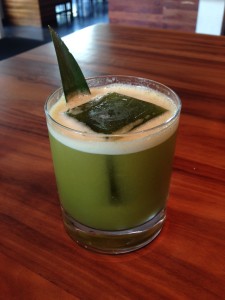By Abby Hart
With the proliferation of the green, farm-to-table restaurants in the current marketplace, is organic alcohol also getting its due? Illumine talks with a local distiller and mixologist to discuss the upside of imbibing sustainable spirits.
Summer in Chicago is exhilarating, especially after the frigid and seemingly endless winter. The parks and beaches stretch far and wide with people relaxing, picnicking and sunbathing. Restaurant sidewalks and patios are packed with al fresco diners, enjoying world-class cuisine paired with cold, refreshing cocktails. Summer is also prime time for browsing the enticing stalls of Green City Market and other city farmers’ markets. For many Chicagoans, choosing whole, chemical-free, organically grown food is a way to ensure the health of their families and the preservation of the environment. The latest place for organic foods to make an appearance is in your cocktail glass.
Koval Distillery in the Ravenswood neighborhood is Chicago’s first since the mid-1800s and has been completely organic since its 2008 opening, a challenging undertaking for co-founders Robert and Sonat Birnecker. The husband and wife team chose to go organic because, as Sonat Birnecker puts it, “We believe in eating organic and being healthy, but also supporting farmers and those who care for the land.”
The Birneckers have housed the entire operation in their distillery to ensure quality – milling grain, mashing the milled grain with water and distilling and bottling the liquor on site. Sonat Birnecker notes that this is a departure from common industry practice, in which milling and mashing occur offsite, but explains, “We like to have as much control over the final product as possible.”
The processes of creating a completely organic alcoholic product is daunting and lengthy, and the Birneckers scout plenty of local organic farmers and ensure that the vendors they work with have organic certification. To become certified by the U.S. Department of Agriculture, famers must submit to having their produce rigorously tested for pesticides and additives, as well as successfully complete soil testing to ensure no cross-contamination or downdrift from non-organic crops. Certified distillers are subject to early testing as well.
Making an organic product has forced the Birneckers to be creative and resourceful. Though much of the produce used in Koval’s products is local, or from the Midwest or California, certain other botanicals and flowers used in their offerings are imported from as far away as Peru, the Czech Republic and Japan.
Koval creates whiskeys with unique organic grains such as spelt, oat and millet. The creative and sustainable methods don’t end with the liquor itself, as the distiller’s whiskeys and bourbons are aged in wood barrels from Minnesota sealed with beeswax, rather than the traditional method of sealing with paraffin.
It makes sense that a restaurant featuring locally-sourced, farm-to-table cuisine would implement an organic cocktail program. At Prasino (Greek for “green”) – with three locations in Chicago’s Wicker Park neighborhood, suburban LaGrange and St. Louis – the cocktail menu has grown to include a wide range of certified organic liquors, infusions and housemade syrups made with organic produce.
Prasino’s beverage director Todd Ekis believes that the organic movement represents the idea of “going back to the basics,” before transportation and additives changed the production of food and drink. “It’s really becoming a lifestyle again,” he says.
Ekis often uses products from Greenbar Collective, a Los Angeles-based organic spirits producer, which plants a tree in the Central American rainforest for every bottle sold. As of December 2013, Prasino alone is responsible for the planting of 2,927 trees.
“It comes down to flavor. Not to generalize, but there are a few traditionally-made citrus vodkas with sort of a chemical aftertaste. With these [organic] vodkas, the flavor is extremely clean and bright,” explains Ekis.
The flavors of organic liquors allow for mixologists to make a more spirit-forward cocktail, because the spirit shines on its own and inspires cocktail crafters to find fresh and bright ingredients to complement that flavor.
After Ekis recently received a bottle of pineapple-infused brugal, an extra dry rum, he used it as the defining spirit in the Poco Verde, a creation comprised of an organic housemade verdita (a blend of fresh pineapple juice, cilantro, mint and seeded jalapeño) and finished with a bright pineapple leaf and a solid cube of frozen pureed cilantro. The result is a slightly sweet, herbaceous and incredibly refreshing concoction.
The taste and environmental benefits are clear, but what about the hangover? Since all of the additives, chemicals and pesticides are stripped away, will organic alcohol leave you feeling less foggy the morning after?
“Well, I can’t say that alcohol in any high volume will result in not having a hangover the next day,” says Koval Distillery’s Sonat Birnecker. “But knowing that alcohol was created with respect for the land, doesn’t that leave you feeling a little better?”
Learn more about the organic philosophies of Koval Distillery and Prasino Restaurants at koval-distillery.com and prasino.com.


























No Responses to “Conscious Cocktailing: The Benefits of Organic Spirits”